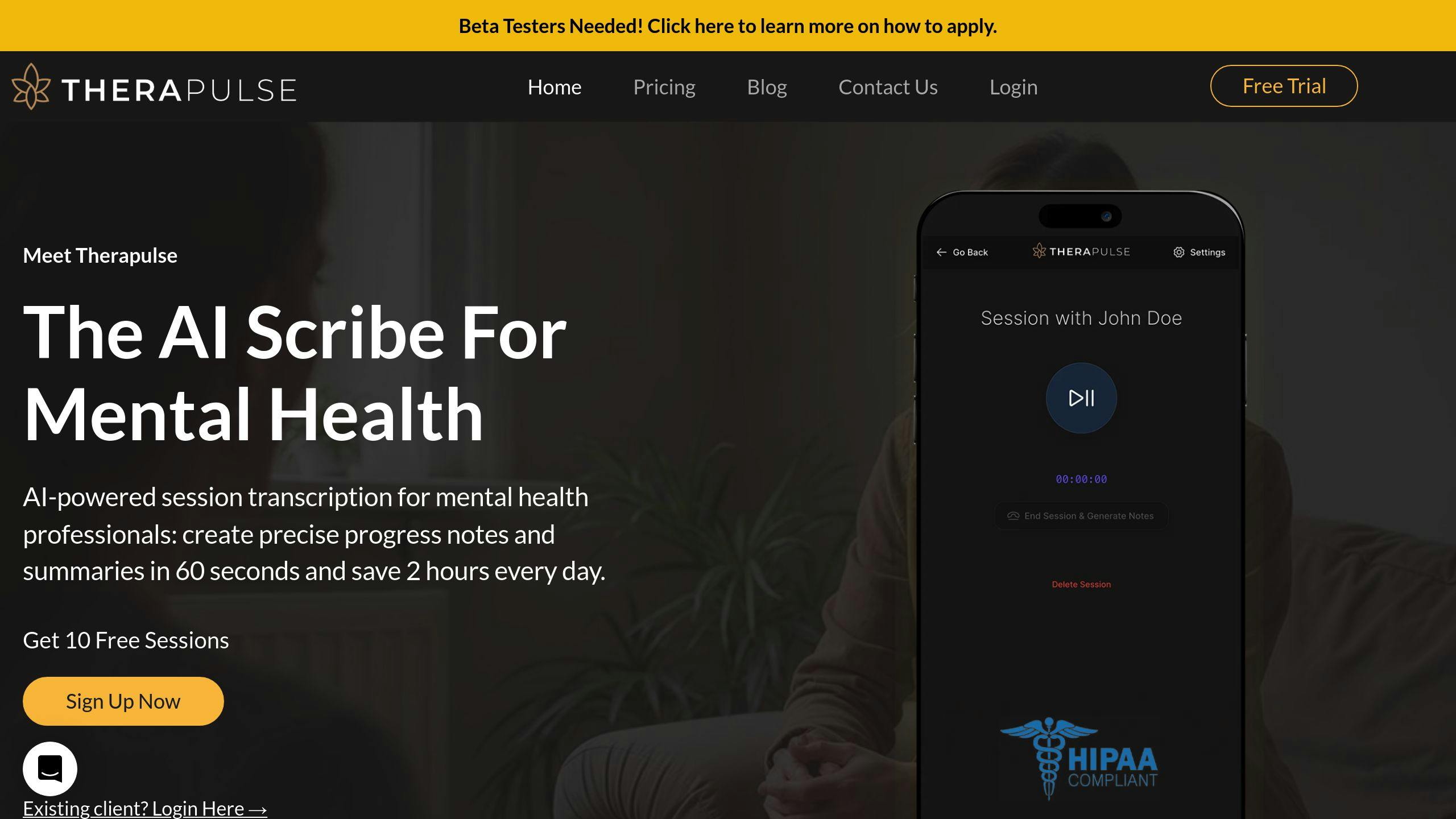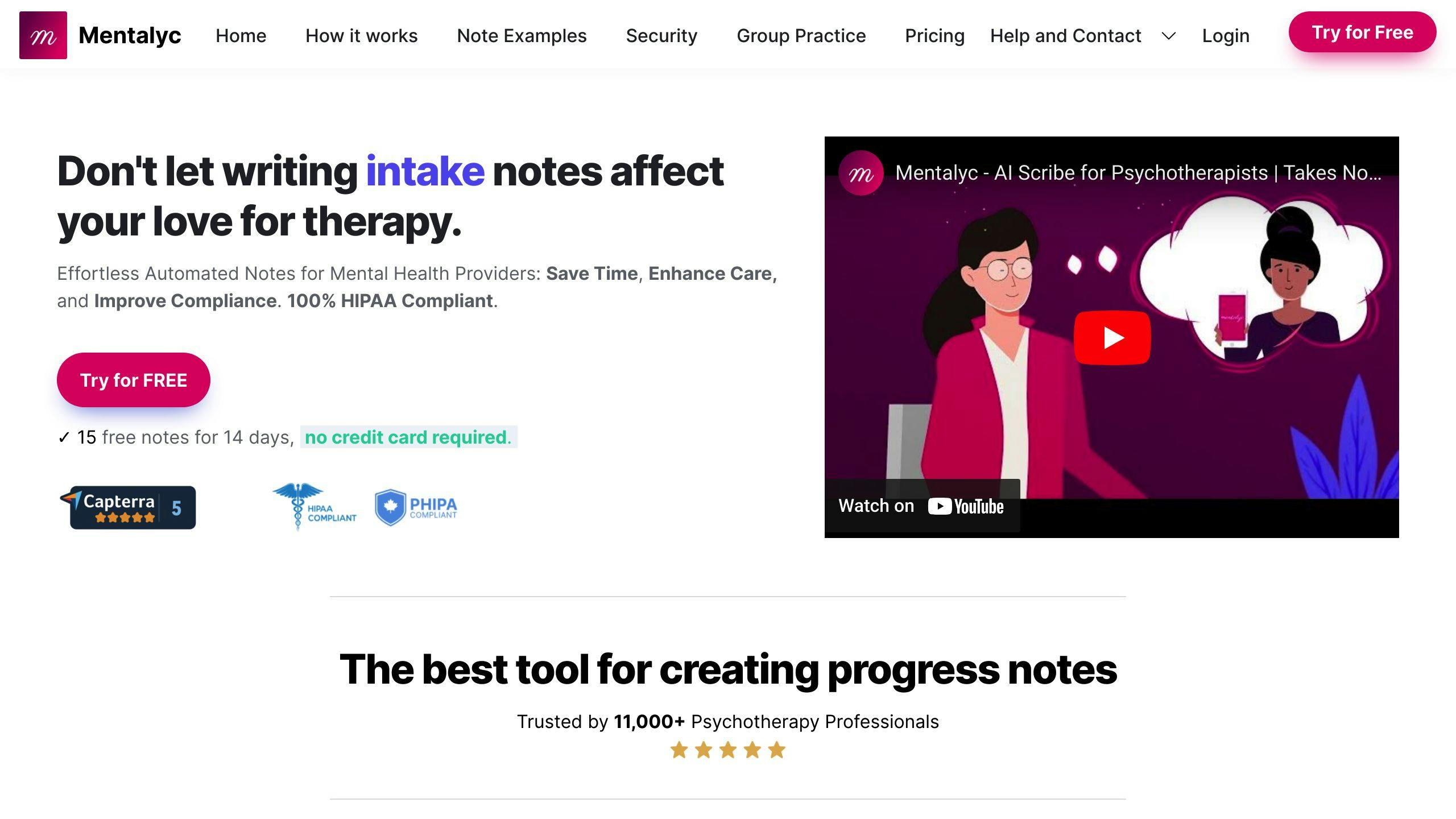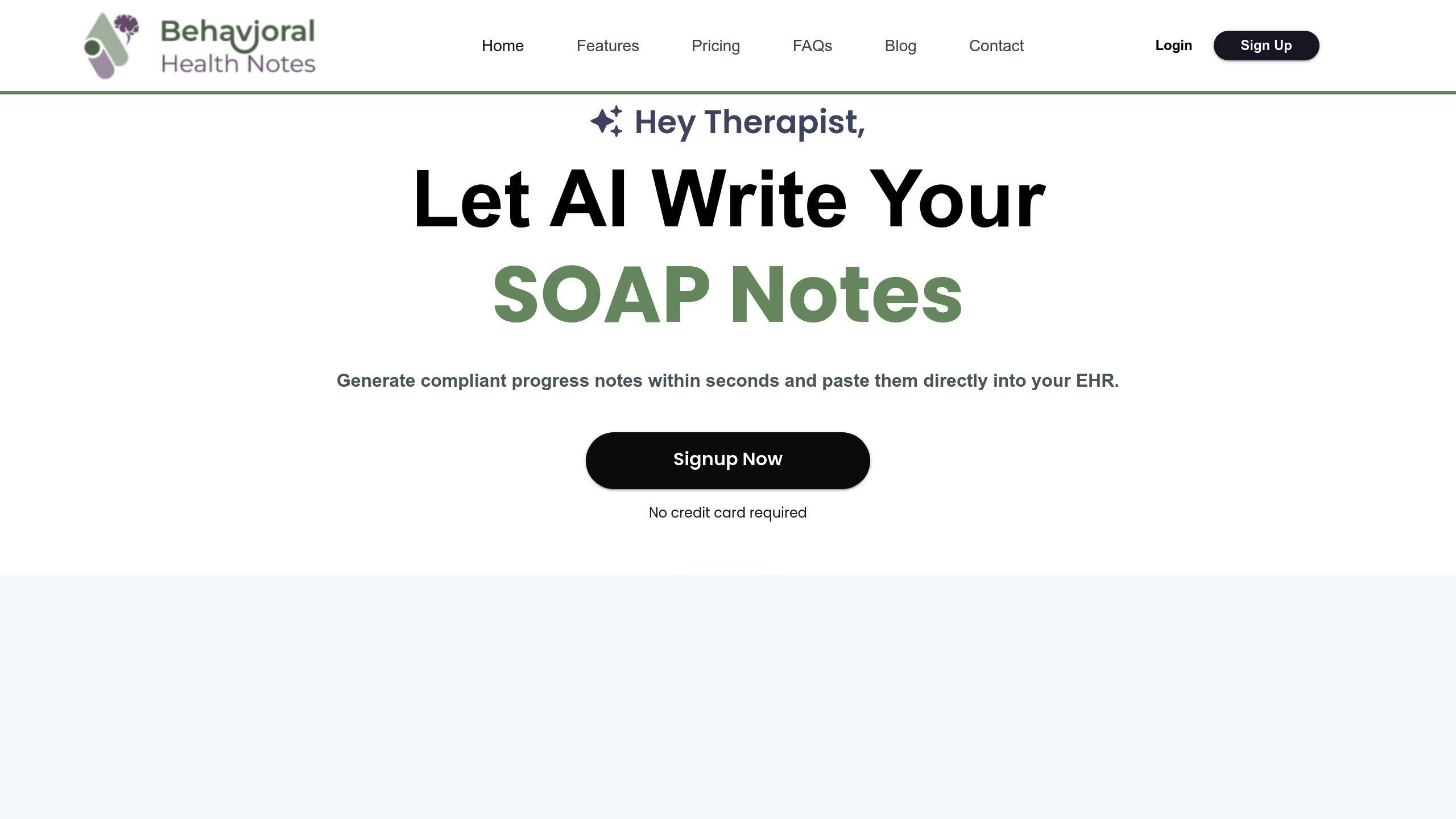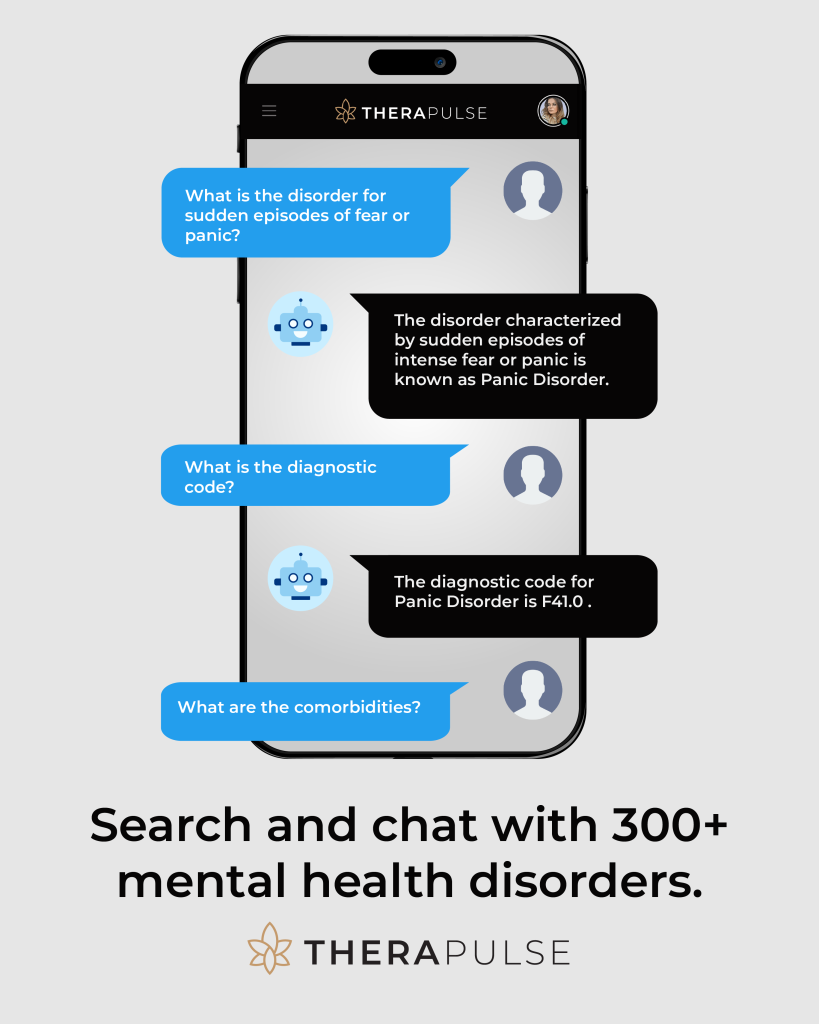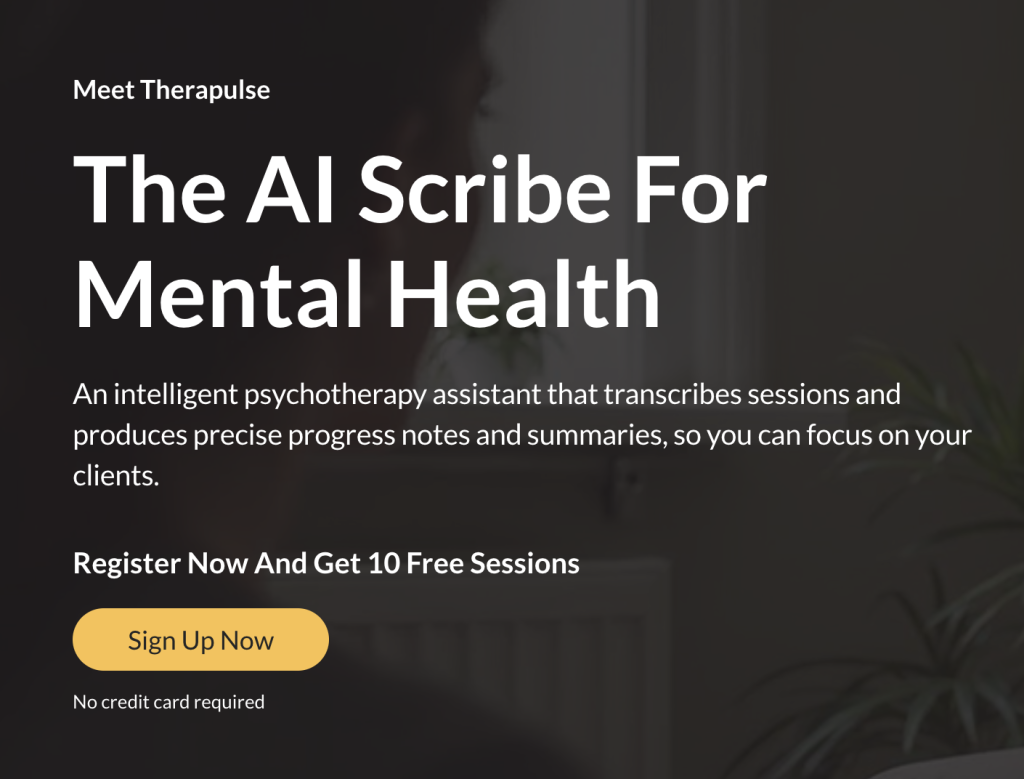AI is transforming mental health care by making documentation faster, more accurate, and easier for clinicians. Platforms like TheraPulse, Mentalyc, and Behavioral Health Notes help therapists save time, improve patient care, and ensure compliance with privacy standards. Here’s how they compare:
Key Features:
- TheraPulse: Live transcription, research tools, and flexible pricing.
- Mentalyc: Psychotherapy-focused templates and automated session summaries.
- Behavioral Health Notes: EHR integration and standardized note formats (SOAP, DAP, BIRP).
Quick Comparison:
| Platform | Key Features | Pricing (Monthly) | Focus Area |
|---|---|---|---|
| TheraPulse | Real-time transcription, research tools | $29–$149 | Automation and flexibility |
| Mentalyc | Tailored templates, session insights | $14.99–$99.99 | Psychotherapy documentation |
| Behavioral Health Notes | EHR integration, secure assessments | Contact provider | Workflow optimization |
These tools streamline administrative tasks, allowing therapists to focus more on patients while maintaining secure and accurate records. Choose the one that fits your practice’s needs and budget.
1. TheraPulse Overview
TheraPulse offers AI-driven tools designed to help mental health professionals streamline their documentation process, allowing them to concentrate on patient care while managing administrative tasks efficiently.
Core Features and Security
TheraPulse provides a combination of real-time transcription, flexible note formats, and AI-powered research tools, all backed by strong security measures. Session Scribe delivers live transcription and supports various note styles tailored to different therapeutic methods. NeuroSearch gives clinicians quick access to relevant research, supporting evidence-based practices. For post-graduates, TheraTrack helps track hours needed for licensure.
It integrates effortlessly with existing EHR and telehealth platforms, accommodating in-person and remote sessions, including couples therapy. Security is a top priority, with proprietary AI models operating in a controlled setting to ensure HIPAA compliance through robust safeguards [3].
Pricing Options
| Plan | Monthly Cost | Session Limit | Key Features |
|---|---|---|---|
| Starter | $29 | 30 sessions | Session Scribe, Automated Progress Notes |
| Standard | $49 | 50 sessions | Session Scribe, Automated Progress Notes |
| Professional | $99 | 100 sessions | Includes NeuroSearch Chatbot functionality |
| Professional+ | $149 | 150 sessions | Full feature set with maximum session capacity |
Pricing ranges from $29 to $149 per month, offering options for practices of different sizes and needs, with advanced tools like NeuroSearch available in higher-tier plans [2].
2. Mentalyc Overview
Mentalyc focuses on addressing the specific needs of psychotherapists, aligning with the growing use of AI in personalizing mental health care. Its tools prioritize security and accuracy, making psychotherapy documentation more efficient.
Core Features and Functionality
Mentalyc simplifies the note-taking process by automating session documentation while maintaining the depth required for therapy. Therapists can adjust terminology and use templates designed for different therapeutic methods [4][6]. It also provides post-session summaries, including important client quotes, ensuring thorough records that meet insurance standards. Plus, it integrates seamlessly with EHR systems, offering templates specifically tailored to psychotherapy [5].
Security and Compliance
| Security Feature | Details |
|---|---|
| Data Security | Encrypted storage; immediate deletion after transcription |
| Information Privacy | Automatic removal of personal identifiers |
| Compliance Standards | Certified under HIPAA and PHIPA guidelines |
| User Control | Option to delete anonymized notes anytime |
Pricing Structure
| Plan | Monthly Cost | Features |
|---|---|---|
| Mini | $14.99 | Basic note-taking features |
| Basic | $29.99 | Additional automation tools |
| Pro | $59.99 | Advanced tools and higher usage limits |
| Super | $99.99 | Full access to all features and maximum capacity |
“Mentalyc enhances session reflection and client conceptualization”, says Daniel Helvetius, a private practice owner [6].
Mentalyc goes beyond just documentation. By automating routine tasks, it allows therapists to focus more on their clients while ensuring their notes meet both professional and insurance requirements [5].
While Mentalyc specializes in tailored documentation and session insights, Behavioral Health Notes offers a broader solution for optimizing mental health care workflows.
3. Behavioral Health Notes Overview
Behavioral Health Notes uses AI to streamline mental health documentation while maintaining secure and thorough records. The platform addresses the growing need for efficient and compliant documentation in mental health care.
Core Documentation Features
The platform offers various note-taking formats tailored to different clinical needs, including DAP (Data, Assessment, Plan), SOAP (Subjective, Objective, Assessment, Plan), and BIRP (Behavior, Intervention, Response, Plan) formats [8]. These formats provide options for clinicians to choose what best suits their practice.
| Note Format | Ideal Use Case |
|---|---|
| DAP Notes | Monitoring progress in long-term therapy |
| SOAP Notes | Assessing specific conditions |
| BIRP Notes | Documenting interventions and responses |
Security and Professional Standards
Behavioral Health Notes adheres to HIPAA and APA guidelines to ensure psychotherapy notes are securely stored and meet professional standards [7]. Advanced encryption and controlled access safeguard sensitive client data [9].
Clinical Integration Benefits
The platform integrates with EHR systems, offering standardized assessment tools, simplified note-taking, and secure collaboration features for providers [8]. These tools not only improve documentation efficiency but also maintain clinical precision, supporting the needs of mental health professionals.
sbb-itb-8e8938b
Comparison of Strengths and Weaknesses
To assist mental health professionals in choosing the right digital tools, here’s a breakdown of the key differences between TheraPulse.ai, Mentalyc, and Behavioral Health Notes.
Feature Comparison
| Feature | TheraPulse.ai | Mentalyc | Behavioral Health Notes |
|---|---|---|---|
| Note Formats | SOAP, DAP, BIRP | Standard formats | SOAP, DAP, BIRP |
| AI Capabilities | Session transcription, automated notes | AI-driven solutions | Limited AI-driven automation |
| Special Features | NeuroSearch AI agent, TheraTrack logger | Psychotherapy-specific templates | EHR integration |
| Pricing | Starting at $29/month | Contact provider for details | Contact provider for details |
Security and Compliance
All three platforms meet HIPAA standards, but their approaches to security differ: TheraPulse.ai emphasizes secure electronic storage [11], Behavioral Health Notes offers advanced encryption [7], and Mentalyc prioritizes anonymization and mental health-specific privacy measures [6].
Strengths and Limitations
“Therapy requires human empathy and interpretation, which AI cannot fully replicate.” – Your Counselling, 2024 [14]
| Platform | Key Strengths | Notable Limitations |
|---|---|---|
| TheraPulse.ai | • Automated transcription • Research assistant feature • Flexible pricing options |
• Limited sessions per plan • Requires staff training • AI validation needed [12] |
| Mentalyc | • AI-driven, tailored to psychotherapy • Personalized note templates • Mental health focus |
• Integration capabilities unclear • Pricing details unavailable • Limited feature documentation |
| Behavioral Health Notes | • Strong EHR integration • Multiple note formats • Standardized assessments |
• Limited AI automation • Focus mainly on documentation • Basic automation features |
“The integration of AI in therapy holds immense potential to revolutionize mental health care, offering increased accessibility, cost-effectiveness, and personalised treatment options.” – Mind Health, 2023 [13]
AI-generated content must be carefully reviewed to ensure accuracy and compliance. Choosing the right platform ultimately depends on your practice’s specific needs, budget, and the level of AI integration you’re looking for.
Final Thoughts
Comparing TheraPulse.ai, Mentalyc, and Behavioral Health Notes highlights how these platforms tackle key challenges in mental health care. AI tools are changing the landscape by improving efficiency and offering more tailored patient care.
These platforms showcase how technology can reshape clinical practices. Trends like advanced AI features, improved data security, and better EHR compatibility are set to push mental health care technology even further.
Each platform brings unique strengths to the table. TheraPulse.ai focuses on automation and offers pricing options suitable for practices of various sizes. Mentalyc takes a psychotherapy-focused approach, showing the benefits of specialized tools. Meanwhile, Behavioral Health Notes stands out with its EHR integration and standardized assessment features.
For mental health professionals, choosing the right tool means assessing their practice’s specific needs and matching them to the strengths of these platforms. While AI automation can streamline processes, it should act as a support system – not a replacement – for the human connection in therapy. The aim is to boost efficiency without losing the personal touch that is so important in mental health care.
Ultimately, the success of these tools will depend on how well they help professionals provide effective, accessible, and personalized care while upholding security and ethical standards. By using these platforms thoughtfully, mental health professionals can find the balance between leveraging technology and preserving the human connection crucial to therapy. As these tools continue to develop, they are likely to play an even bigger role in the future of mental health care.
FAQs
Can I use AI to write therapy notes?
Yes, AI can help with therapy notes using specialized platforms like TheraPulse.ai and Mentalyc. These tools are HIPAA-compliant and offer features tailored for mental health documentation, such as secure data handling, automated formatting, and customizable templates.
“AI-generated notes don’t contribute to clinical thinking. Therapists weren’t taught clinical documentation in graduate school and most likely did not learn it on the job. Many therapists find AI for note writing attractive because they are intimidated by the documentation process.” – Documentation Wizard, LLC [10]
If you’re considering AI for therapy documentation, keep these key points in mind:
- Security and Compliance: Opt for platforms that include HIPAA safeguards and privacy features specific to mental health records [15].
- Clinical Accuracy: Always review AI-generated notes to ensure they reflect the nuances of your sessions and remain therapeutically relevant [16].
- Workflow Support: Use AI to simplify administrative tasks, but continue honing your documentation skills for professional growth.
Specialized mental health platforms are better suited for therapy documentation than general AI tools. They save time on administrative tasks while ensuring compliance and quality, but it’s crucial to integrate them thoughtfully to maintain the therapist’s unique insights and observations [16].



